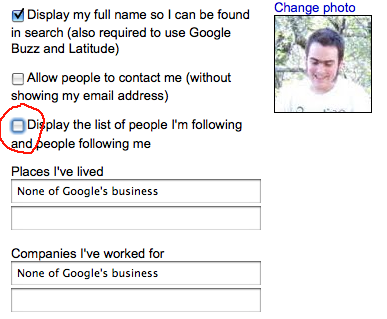It’s now been several months since I started using Twitter. I decided to try it because I wanted to give it a fair chance; maybe I would find out why so many people are so excited about it.
I haven’t. Twitter hasn’t really added anything to my life. I haven’t been able to answer the question “What is Twitter good for?”. I think I’m about done with it now.
Possible answers to “What is Twitter good for?”:
Reading: I can’t think of one thing I learned from reading Twitter that made me any smarter, happier, or improved my relationship with another person. (Who knows, maybe I’m reading the wrong people.) Reading Twitter has given me a few good laughs per day, but mostly it’s just lowered my productivity, made me feel more distracted, and increased the number of Firefox tabs I have open at a time.
Writing: Tweeting feels like shouting into a windstorm. It doesn’t start a conversation. Everyone’s talking at once, and nobody’s listening. Everything I’ve said as a tweet would have been better as a short blog post; at least it would have a chance of starting a conversation and getting some feedback.
Self-promotion: I know there are a few people who have read my blog posts because I tweeted the links who wouldn’t have read otherwise. It’s kind of like publishing an RSS feed; or rather, a paralell redundant system to RSS feeds. I’m vaguely considering keeping my Twitter account for the sole purpose of pushing links to blog posts.
Asking Questions: If you have a question and you’re not sure who the best person to ask is, you can publicly ask it on Twitter and hope someone answers. Once or twice I have gotten a quick response this way. It’s not very reliable, though.
Re-Tweeting: I don’t retweet links; I always ask myself, what would I be contributing to the Internet by doing so? And the answer is “nothing”. Most of the links that come up on Twitter are so-called “viral” links. It’s not a compliment to compare something to a virus. A viral link is one that has no value other than encouraging people to pass it on. It is not information you can act on; it does not educate or shape decisions. You read it, say “Huh; that’s interesting” and then there’s nothing to do with it except… show it to other people. I don’t want to be part of that game. Being a signal-repeater is a job for internet routing hardware, not humans.
Poetry: My favorite Twitter users are the ones who use the 140-character limit as a restriction to breed creativity, like a haiku or a koan. Like Shitmydadsays, Fireland, and feministhulk. These writers have turned Twitter into an artistic medium, and I respect that.



